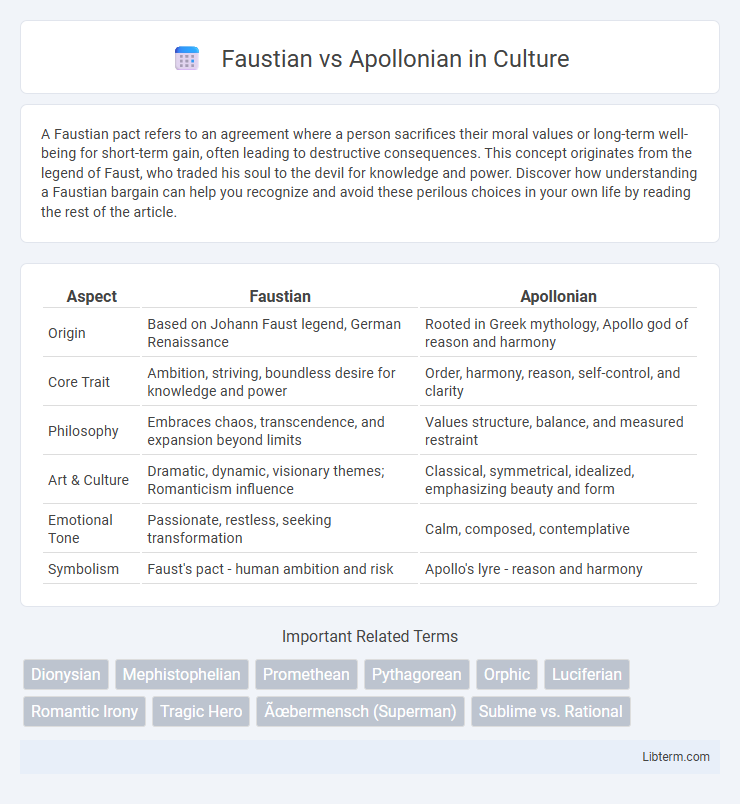A Faustian pact refers to an agreement where a person sacrifices their moral values or long-term well-being for short-term gain, often leading to destructive consequences. This concept originates from the legend of Faust, who traded his soul to the devil for knowledge and power. Discover how understanding a Faustian bargain can help you recognize and avoid these perilous choices in your own life by reading the rest of the article.
Table of Comparison
| Aspect | Faustian | Apollonian |
|---|---|---|
| Origin | Based on Johann Faust legend, German Renaissance | Rooted in Greek mythology, Apollo god of reason and harmony |
| Core Trait | Ambition, striving, boundless desire for knowledge and power | Order, harmony, reason, self-control, and clarity |
| Philosophy | Embraces chaos, transcendence, and expansion beyond limits | Values structure, balance, and measured restraint |
| Art & Culture | Dramatic, dynamic, visionary themes; Romanticism influence | Classical, symmetrical, idealized, emphasizing beauty and form |
| Emotional Tone | Passionate, restless, seeking transformation | Calm, composed, contemplative |
| Symbolism | Faust's pact - human ambition and risk | Apollo's lyre - reason and harmony |
Introduction to Faustian and Apollonian Archetypes
Faustian archetypes embody a relentless quest for knowledge, power, and transcendence, reflecting human ambition and the desire to surpass limitations. Apollonian archetypes represent order, harmony, and rationality, emphasizing balance, clarity, and structured beauty in human experience. These contrasting paradigms originate from Nietzschean philosophy, highlighting the tension between chaos-driven creativity and disciplined control.
Historical Origins of Faustian and Apollonian Concepts
The Faustian concept originates from the German legend of Faust, a scholar who made a pact with the devil, embodying the spirit of ambition, exploration, and the relentless quest for knowledge during the Renaissance and Enlightenment periods. The Apollonian concept, rooted in ancient Greek mythology, symbolizes order, logic, and harmony, inspired by the god Apollo who represented reason and clarity in contrast to Dionysian chaos. These historical origins reflect contrasting worldviews that have influenced Western philosophy, art, and culture, with Faustian embodying dynamic striving and Apollonian emphasizing restraint and form.
Core Characteristics of the Faustian Spirit
The Faustian spirit embodies an insatiable quest for knowledge, boundless ambition, and relentless striving beyond human limitations. It is characterized by a restless energy that prioritizes scientific inquiry, technological innovation, and mastery over nature. Rooted in individualism and existential challenge, the Faustian archetype contrasts sharply with the Apollonian emphasis on harmony, order, and restraint.
Defining Features of the Apollonian Ideal
The Apollonian ideal is characterized by order, harmony, and rationality, emphasizing clarity and self-discipline in human behavior and artistic expression. It embodies structured beauty, balance, and restraint, reflecting the principles of logic and formality in contrast to chaotic impulses. Rooted in classical Greek aesthetics, the Apollonian represents the pursuit of enlightenment through reason and controlled emotions.
Faustian vs Apollonian in Philosophy and Literature
The Faustian archetype in philosophy and literature embodies relentless striving, curiosity, and the desire to transcend human limitations, often leading to moral ambiguity and tragedy. The Apollonian archetype represents order, harmony, rationality, and a measure of restraint, emphasizing balance and clarity in human behavior and artistic expression. This dichotomy explores the tension between passion and reason, chaos and structure, influencing works from Goethe's *Faust* to Nietzsche's analysis in *The Birth of Tragedy*.
Cultural Manifestations: East vs West Perspectives
The Faustian cultural paradigm, rooted in Western traditions, emphasizes boundless ambition, individualism, and the pursuit of transcendence through technological and intellectual conquest, as seen in European literature and American innovation. In contrast, the Apollonian perspective, prominent in Eastern cultures such as Japan and China, values harmony, order, and restraint, reflecting ideals of balance and spiritual depth evident in classical art, Zen Buddhism, and Confucian philosophy. These divergent worldviews shape distinct cultural manifestations, influencing everything from governance and art to social values and collective identity across East and West.
The Tension Between Passion and Reason
The Faustian archetype embodies the relentless pursuit of knowledge and passion, often pushing beyond moral or rational boundaries to achieve personal ambition. In contrast, the Apollonian ideal emphasizes order, reason, and self-discipline, promoting harmony through control and moderation of emotions. The tension between these forces reflects a fundamental human conflict between the desire for profound experience and the necessity of rational structure.
Impact on Modern Society and Technology
The Faustian drive for limitless exploration and domination fuels modern technological innovation, pushing boundaries in artificial intelligence, space exploration, and biotechnology with an insatiable quest for progress. In contrast, the Apollonian emphasis on order, harmony, and balance shapes ethical frameworks, sustainable design, and user-centric technologies that prioritize human well-being. Together, these archetypes influence the dual nature of contemporary society--advancing rapidly while continuously negotiating ethical and existential challenges.
Critiques and Reinterpretations Through Time
Critiques of the Faustian versus Apollonian dichotomy highlight its oversimplification of complex cultural dynamics, often ignoring the fluid interplay between irrationality and rationality. Reinterpretations through time emphasize the coexistence of these forces, integrating psychoanalytic and postmodern perspectives to challenge rigid binaries. Contemporary scholarship explores how the Faustian drive for endless striving contrasts yet complements Apollonian order, revealing nuanced human experiences beyond traditional contrasts.
Conclusion: Harmonizing Faustian and Apollonian Dynamics
Harmonizing Faustian and Apollonian dynamics involves integrating the Faustian drive for exploration, ambition, and transformation with the Apollonian values of order, reason, and harmony. Achieving a balance between these opposing forces fosters innovation grounded in ethical reflection and structured creativity. This synthesis promotes a holistic approach to personal and cultural development, enabling sustainable progress and meaningful fulfillment.
Faustian Infographic

 libterm.com
libterm.com